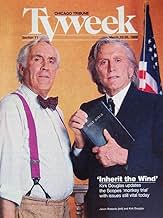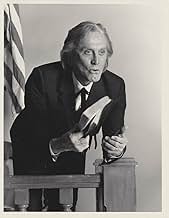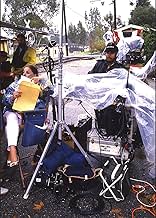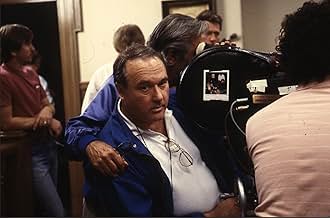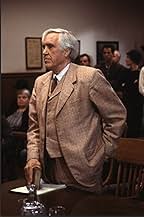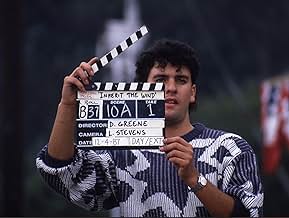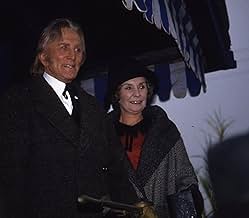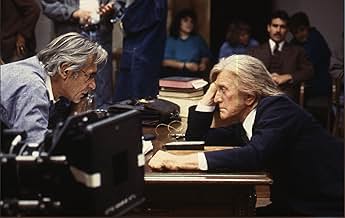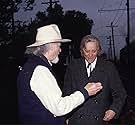Ajouter une intrigue dans votre langueA biblical orator opposes a liberal lawyer defending a man for teaching Darwinism in the 1920s South.A biblical orator opposes a liberal lawyer defending a man for teaching Darwinism in the 1920s South.A biblical orator opposes a liberal lawyer defending a man for teaching Darwinism in the 1920s South.
- Director
- Writers
- Stars
- A remporté 2 prix Primetime Emmy
- 2 victoires et 1 nomination au total
- Bailiff
- (as Thom McCleister)
- Radio Newsman
- (as Richard Gilbert Hill)
Avis en vedette
This isn't to say its bad, its not. The problem is that compared to the original Spencer Tracy film this film comes off as a good summer stock to the originals Broadway show case.
The cast is game. Kirk Douglas is perhaps a bit odd at first as the William Jennings Bryan character, but after a few minutes he slips into the groove and all is fine. Jason Robards' is excellent, unfortunately there is something about the way this was put together for TV that kills his momentum in the home stretch.
Seeing this with out commercials doesn't help since the pauses still are there.
If its on try it, but if you must see some version of this go for one of the other two.
*** 1/2 (out of 4)
The second of three remakes of the 1960 Spencer Tracy/Frederic March film once again takes a look at the infamous Scopes trial. The film centers on a teacher who is arrested for teaching the theory of evolution. A religious prosecutor (Kirk Douglas) takes on the defender (Jason Robards) in a case about the right to think. I personally think that the 1960 film is one of the greatest movies ever made and it contains some of the most powerful actor of any movie ever made. It would be rather silly to go into the remake expecting anything as powerful but this film actually comes pretty close. The film has been slightly rewritten and it takes a look at the case from a different side but the movie remains quite powerful and contains some very good acting. The only real problem here is that the movie only runs around 96-minutes, which means we lose some character development. The actual real case has pretty much been proved as a fraud but it certainly makes for an interesting debate, which carries over very well to film. I think, like the original film, this one is a bit too one sided and shows the religious aspect unfairly but while saying this there's no doubt that the original trial showed evolution in an unfair way. As I said earlier, I think both Tracy and March delivered two of the most powerful performances in the history of film but Robards and Douglas do great work here. Douglas really gets into his character so much that you feel as if you're watching the real guy and not Douglas giving a performance. His speech in the church early on is among some of the best preaching I've seen from any actor or any real preacher. Robards was an excellent choice to go up against Douglas and he too delivers a strong performance and the two men together, during the final courtrooms scene, contain enough fireworks to really get your blood pumping. Darren McGavin, John Harkins, Megan Follows and Gene Simmons all add great supporting in their performances. In the end, this film is far from the 1960 version but it's still a very good little gem with great performances and an always interesting story.
And where the old black and white version suggested the oppressive heat and humidity of Dayton, Tennessee, this one didn't even come close. Darren McGavin who played H. L. Mencken was quite good though and easily erased the memory of Gene Kelly in the original. And I've always adored Jean Simmons in most of what she did. Kyle Secor was the Scopes character (I mistook him for Matthew Broderick) and was very adequate.
I'd be interested to see (again?) the 1965 TV version with Melvyn Douglas and Ed Begley but I don't remember it at all if I did see it.
This was that film. I saw it when it was first aired when I was 14 and it made an impression on me. We had read the play a year earlier in 7th grade but it was Jason Robard's portrayal of the playfully witty grumpy grandpa who made the movie.
If you like Robards this movie cannot be missed. His portrayal of an ideal Atheist is good, even if it the reality of Clarence Darrow's personality. The way he gives sage advise to Cates about "Golden Dancer" - "Bert, whenever you see something bright, shining, perfect-seeming—all gold, with purple spots—look behind the paint! And if it's a lie—show it up for what it really is!" - cannot be beat. Robard's perfect rendition of this epic metaphor for a young man to follow in his hard and often lonely search for truth is what makes this film.
As an adult now, I have seen the classic version of this but there are benefits to this old made for TV movie - if you can find it, see it - and also drop me a line about where I can find it - I had my old VHS for years but can't find it!
Le saviez-vous
- AnecdotesThe real William Jennings Bryan ran for President three times: 1896, 1900, and 1908. Bryan was the first Presidential candidate to extensively barnstorm during a Presidential campaign in an era when most candidates did not. Although it's suggested that he might be contemplating a run in the next election, which would have been in 1928, it's highly unlikely. He did serve in public office twice - as Congressman from Nebraska from 1891 to 1895 and as Secretary of State under Woodrow Wilson from 1913 to 1915, when he resigned over the country's policy toward Germany after the Lusitania was sunk. Despite his fundamentalist Christian beliefs, he was considered as Liberal and Progressive, supporting anti-Imperialist policies and trust-busting.
- GaffesIn several courtroom scenes when the focus is on Bertram Cates, the actor, Kyle Secor, wears glasses in which you can see the reflection of the production lights as well as white flags used by the production staff to mute the lights. In the 1930s, courtrooms would have utilized electric lights with a milk glass lamp shade known as a "schoolhouse light".
- Citations
Rachel Brown: I don't understand it, and what I do understand I don't like. I don't believe I came from apes and monkeys. You see, I really haven't thought very much. I was always afraid of what I might think. It seemed safer not to think at all. Maybe - maybe what Mr. Darwin wrote is bad. Bad or good I think ideas have to come out. I think they should be heard. I don't think they ought to pass laws against them.
- ConnexionsFeatured in The 40th Annual Primetime Emmy Awards (1988)
Meilleurs choix
Détails
- Date de sortie
- Pays d’origine
- Langue
- Aussi connu sous le nom de
- Inherit the Wind
- Lieux de tournage
- sociétés de production
- Consultez plus de crédits d'entreprise sur IMDbPro
Contribuer à cette page


